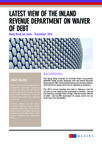Dec. 2013 - Latest view of the Inland Revenue Department on waiver of debt
Latest view of the IRD on waiver of debt
The 2013 annual meeting was held in February and the minutes of the meeting was published in October. During the meeting, amongst other things, they discussed “Waiver of debt” and the IRD expressed its views, which we are covering in this newsletter.
Section 15(1)(c) of the Inland Revenue Ordinance (“IRO”) deems “sums received by or accrued to a person by way of grant, subsidiary or similar financial assistance in connection with the carrying on of a trade, professional or business in Hong Kong, other than sums in connection with capital expenditure made or to be made by the person” to be “receipts arising in or derived from Hong Kong from a trade, professional or business carried on in Hong Kong” and therefore chargeable to Hong Kong profits tax.
It has been a long practice of practitioners to claim waiver of loans as non-taxable on the basis that no money is received by or accrued to a company if the debts were not built up by trading transactions or expenses previously claimed as tax-deductible expenses. In the past, such filing basis had seldomly be challenged by the IRD. The HKICPA raised the issue of whether Section 15(1)(c) is applicable to waiver of loan as no money is received by or accrued to a company and sought confirmation from the IRD.
During the meeting, the IRD explained that when the lender waived the loan, a financial assistance might become available to the borrower. Therefore, the sum waived by the lender might “accrue” to the company by way of a “grant, subsidiary or financial assistance” at the time of waiver. Accordingly, Section 15(1)(c) may be applicable to the waiver of loan and the amount will be treated as taxable trading receipts if it is in connection with the carrying on of a trade, professional or business in Hong Kong.
The HKICPA then asked whether Section 15(1)(c) should not be applicable when the sole purpose of waiving the loan is to facilitate the company to be solvent before undergoing members’ voluntary liquidation.
The IRD’s response is interesting...
The IRD explained that for liquidation cases suffering serve losses, it would not normally be an issue of concern after the set-off of the losses by the waiver of loan. It implies that the waiver of loan would not create additional tax liability to the taxpayers who have suffered losses and would undergo liquidation.The IRD further expressed its view that the wording “in connection with the carrying on of a trade…” would imply a wider meaning than “for the purpose of the trade…”. Hence, if the loan at the very beginning was incurred “in connection” with a trade, it would have to look backwards so as to decide whether the subsequent waiver was “in connection with” the carrying on of a trade even though the waiver of loan happened after the cessation of business by the company.
Apart from Section 15(1)(c), the IRD also reminded that where a deduction for interest on loan or debt had previously been allowed, the interest waived subsequently would be treated as taxable trading receipts under Section 15(2).
In light of the clarification for the waiver of loan by the IRD in the annual meeting, taxpayers should pay attention to the tax implication on the waiver of loan, especially under the situation of waiver of inter-company loan. If a Hong Kong company (“Company A”) waives the amount due from its related Hong Kong company (“Company B”), the waiver amount will become financial assistance accrued to Company B at the time of waiver. From Company B’s perspective, the waiver amount would be treated as its taxable trading receipts under Section 15(1)(c) if the loan borrowed by Company B was in connection with the carrying on of a trade, professional or business in Hong Kong.
On the other hand, the waiver will not be a tax deduction for Company A on the grounds that waiver of debt was not incurred in the production of Company A’s chargeable profits unless Company A is engaged in money lending business.

